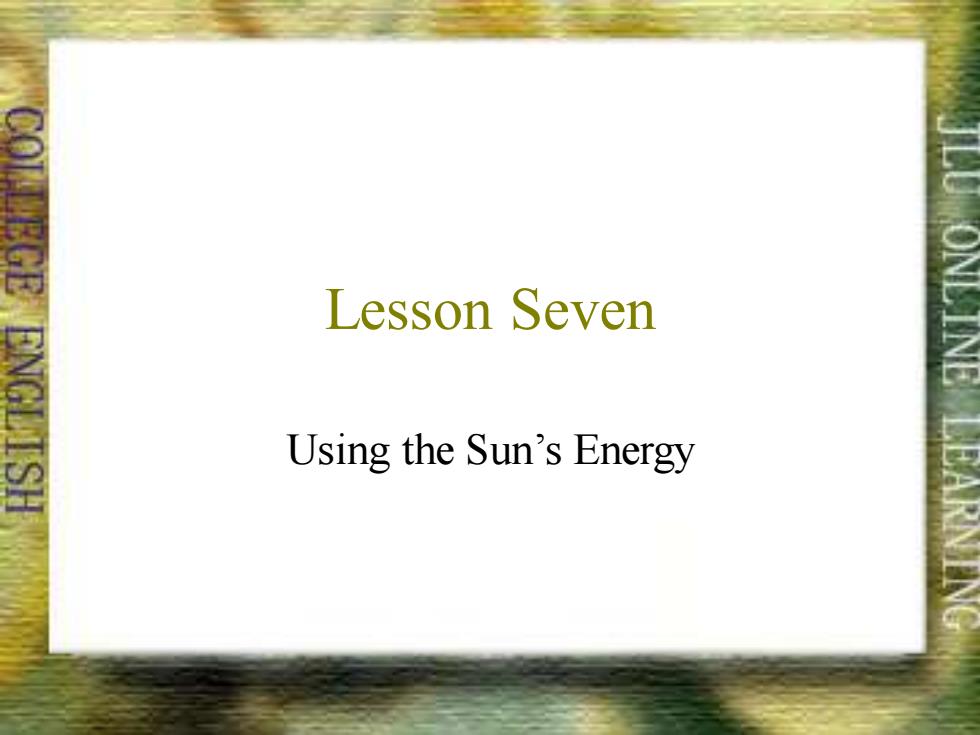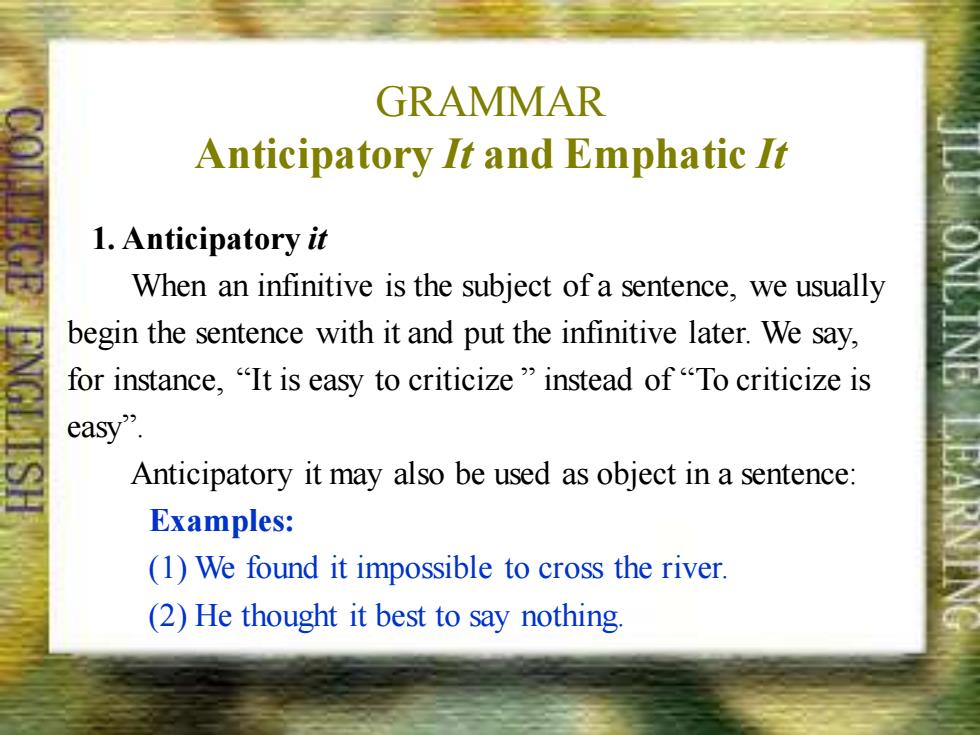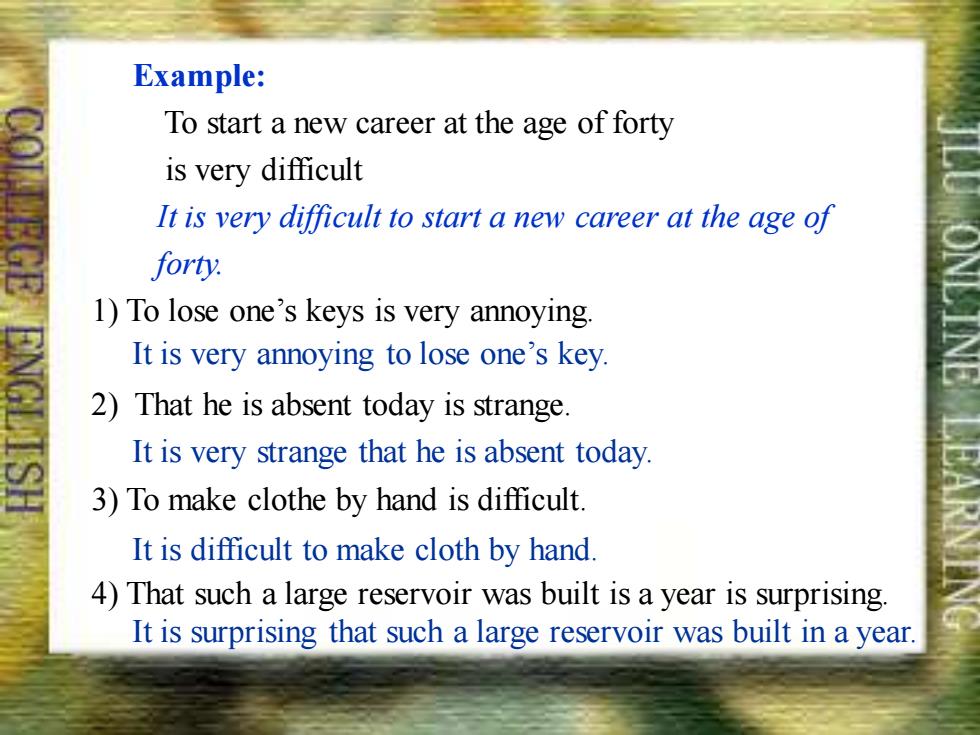
Lesson Seven Using the Sun's Energy
Lesson Seven Using the Sun’s Energy

GRAMMAR Anticipatory It and Emphatic It 1.Anticipatory it When an infinitive is the subject of a sentence,we usually begin the sentence with it and put the infinitive later.We say, for instance,"It is easy to criticize"instead of"To criticize is easy". Anticipatory it may also be used as object in a sentence: Examples: (1)We found it impossible to cross the river. (2)He thought it best to say nothing
GRAMMAR Anticipatory It and Emphatic It 1. Anticipatory it When an infinitive is the subject of a sentence, we usually begin the sentence with it and put the infinitive later. We say, for instance, “It is easy to criticize ” instead of “To criticize is easy”. Anticipatory it may also be used as object in a sentence: Examples: (1) We found it impossible to cross the river. (2) He thought it best to say nothing

It can be used in the same way when the subject of a sentence is a clause. Examples: (1)It is strange that he has not returned. (2)It occurred to me that he might have forgotten about the meeting. 2.Emphatic it When we want to emphasize the subject,the object or the adverbial in a sentence,we can use the construction "it is (was) ..that (who,where,etc.)..."The relative pronoun which is not normally used in it. Examples:
It can be used in the same way when the subject of a sentence is a clause. Examples: (1)It is strange that he has not returned. (2)It occurred to me that he might have forgotten about. the meeting. 2. Emphatic it When we want to emphasize the subject, the object or the adverbial in a sentence, we can use the construction “it is (was) …that (who, where, etc.)…” The relative pronoun which is not normally used in it. Examples:

(1)It was Benjamin Franklin who invented the lighting conductor. (2)It was a very small audience that I read my poem to. (3)It was in 1945 that he first met Elsie (4)It was by sheer accident that they discovered the lost treasure. Now let's do exercise 4 on page 138: 4.The sentences below have infinitives or 'that'clause as subjects.Put these subjects after the verb and use the anticipatory it before the verb.Make comments where necessary.(e.g.which one reads etc,etc.)
(1) It was Benjamin Franklin who invented the lighting conductor. (2) It was a very small audience that I read my poem to. (3) It was in 1945 that he first met Elsie. (4) It was by sheer accident that they discovered the lost treasure. Now let’s do exercise 4 on page 138: 4. The sentences below have infinitives or ‘that’ clause as subjects. Put these subjects after the verb and use the anticipatory it before the verb. Make comments where necessary . (e.g. which one reads etc, etc.)

Example: To start a new career at the age of forty is very difficult It is very difficult to start a new career at the age of for水 1)To lose one's keys is very annoying. It is very annoying to lose one's key. 2)That he is absent today is strange. It is very strange that he is absent today 3)To make clothe by hand is difficult. It is difficult to make cloth by hand 4)That such a large reservoir was built is a year is surprising. It is surprising that such a large reservoir was built in a year
Example: To start a new career at the age of forty is very difficult It is very difficult to start a new career at the age of forty. 1) To lose one’s keys is very annoying. 2) That he is absent today is strange. 3) To make clothe by hand is difficult. 4) That such a large reservoir was built is a year is surprising. It is very annoying to lose one’s key. It is very strange that he is absent today. It is difficult to make cloth by hand. It is surprising that such a large reservoir was built in a year